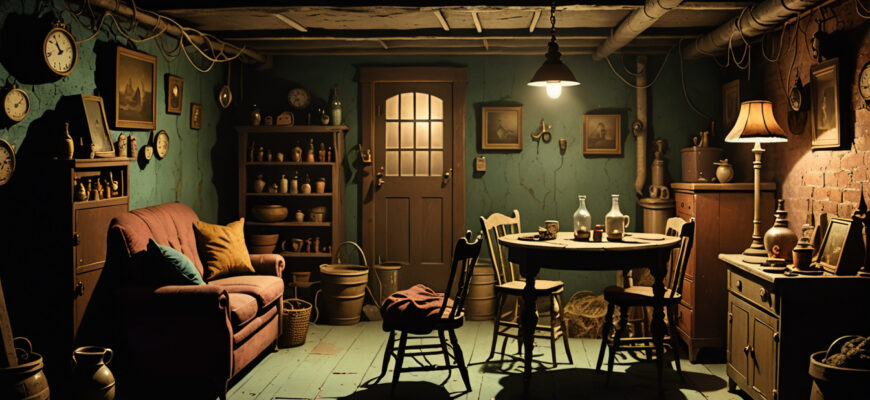Ever had one of those dreams that sticks to your ribs the next morning? Like, you’re walking around your day just a little haunted. Dreams about basements tend to do that. They aren’t just bizarre subconscious wanderings—they’re more like a late-night distress signal from the deeper parts of your mind. It’s rarely about an actual basement; it’s about what you’ve buried that finally wants to be seen.
In dream space, basements often represent the hidden corners of the psyche. That room under the house? It’s a metaphor for everything underneath your surface: old fears, repressed memories, unresolved trauma, family dynamics, and emotional debris you didn’t know you were still carrying. This isn’t random. Carl Jung referred to these lower layers as the shadow self—a collection of all the parts of you you’ve disowned or forgotten. Spiritually, the basement can point to root chakra imbalances: fear, shame, a shaky sense of safety.
And these dreams don’t happen out of the blue. People tend to dream about basements when anxiety is high, old pain resurfaces, or life pushes them toward deeper self-reflection. During times of collective stress or personal burnout, your subconscious might send you underground—not to scare you, but to help you unlock what you’re finally ready to process. Bottom line? You’re not dreaming about concrete walls. You’re dreaming about the emotional weight you shoved behind them.
Common Basement Dream Scenarios And Their Symbolic Meanings
Dreaming of a basement isn’t just one-size-fits-all—it varies based on your emotions, surroundings, and interactions inside the space. Each scenario acts as a coded message from your inner world, and while the dream might unsettle you, it’s often hinting at areas of your life begging for some attention.
- Can’t escape or feel trapped: This often reflects the panic that comes when parts of your past try to resurface. You might be wrestling with an old truth you managed to outrun until now. Many people have these dreams when they’re feeling paralyzed in their healing journey—unable to move forward, but scared of going back.
- Basement full of clutter or water: Picture this: boxes stacked ceiling-high, forgotten items sprawled across concrete floors, or rising water soaking everything. These images mirror emotional buildup. Maybe it’s unprocessed grief, maybe it’s mental chaos from keeping too much inside. The water specifically? Suppressed feelings threatening to overflow. You don’t need a therapist to tell you something’s rising up.
- Discovering old furniture or strange artifacts: Ever walk through a basement in your dream and spot a childhood toy, a family portrait, or a broken chair from your teenage bedroom? These moments often connect directly to your identity—pieces of yourself you abandoned or forgot. While the emotional impact can be heavy, the dream might also be trying to reunite you with something you’ve lost sight of—something that can help you heal.
- Seeing people you know, especially the dead: Interactions with late relatives or estranged parents in a basement setting can feel brutally honest or deeply comforting—it depends on the vibe. These dreams often indicate unresolved dynamics, guilt, or longing for reconnection. Maybe you weren’t done saying goodbye. Maybe you’re stuck replaying a pattern you inherited.
- Silence in complete darkness: No clutter, no ghosts—just you, eyes wide open, sitting in blackness. This is the dream equivalent of emotional and spiritual stillness. It may signal a period where your system is numbing out or placing you in pause mode. But it’s not just avoidance—sometimes it’s incubation. Something in you is growing roots before you bloom. Stillness doesn’t mean nothing’s happening.
Does Darkness Mean Something Bad? Not Always
Darkness in dreams can feel menacing, but don’t assume the worst just because you can’t see clearly. That unsettled feeling might not be danger—sometimes it’s just uncertainty asking for your attention. The instinct is to run, but what if you listened instead?
Facing the “dark” isn’t about inviting drama—it’s about finally being honest. What have you buried because you didn’t have the tools, the time, or the language? Once you stop dodging the discomfort, you might realize the basement isn’t your enemy—it’s your archive.
| Darkness Symbolism | Spiritual Connection | What It Might Be Telling You |
|---|---|---|
| Pitch-black setting | Unconscious mind / inner void | Time to acknowledge hidden fears |
| Silence or no movement | Spiritual stillness, gestation period | Growth is happening quietly |
| Shadowy corners | Ignored emotions or secrets | What are you afraid to confront? |
| Lack of light source | Disconnected from truth or inner guidance | Look inward, not outward |
Spiritually, darkness is often where growth begins. Think of fertile soil—it’s hidden, quiet, and rich with potential. The same goes for your dream’s underground space. If the dream ties in with a feeling of being unsafe, your root chakra might be asking for balance. That looks like anchoring into basic needs: stability, safety, and worth. When you tend to your inner foundation, the shadows lose their power. They stop chasing you and start guiding you.
Dream Symbology with a Jungian + Spiritual Lens
Why do we keep dreaming about the basement—the lowest level, the darkest space, the place nobody visits unless they have to? You’re not just dreaming about concrete floors and broken lightbulbs. A basement dream is more like your psyche flipping on a flashlight and asking: Are you ready to look at what you’ve buried?
Carl Jung called this the “Shadow Self”—the darker, rejected pieces of yourself that don’t fit the version of you the world sees. The basement is where all of that gets shoved: the rage you suppress, the shame you avoid, the fears you pretend you’re over. It’s the psyche’s storage room for the emotions that feel too raw or risky for daylight.
But there’s more. Spiritually, basements aren’t just dumping grounds for trauma—they are soul archives. Layers of your identity live down there: old family wounds, early childhood memories, or even the version of you that stopped smiling that one year and never came back. These dreams can feel like an unplanned initiation, asking you to sift through the emotional dust and greet the pieces that got left behind. Not for closure. For wholeness.
And sometimes—just sometimes—the dream shifts. Instead of just fear, there’s surprise. A treasure chest behind a rotting wall. A box with your name on it filled with journals or art. In stories across cultures, going into a dark place and leaving with gold is a sign not just of healing but of power. What you find in the psychic basement might have been shaped by trauma—but it’s still yours. A gift, locked away because of what it once triggered.
These dreams aren’t asking you to be fearless. They’re asking you to be honest. To feel what you once couldn’t. And maybe… to open a door you’ve kept locked for a long time.
What to Ask Yourself After a Basement Dream
- Am I stuck living through a past version of me that’s no longer true?
- What part of my life or healing work have I been skipping or ignoring?
- Who/what visited me in this dream—why now, and what do they bring up emotionally?
Use these questions like a flashlight. Not to explain your dream away, but to sit with the emotional mess it might be reflecting. Dreams don’t lie—but they do speak in code. Your body knows the truth, even if your mind isn’t ready to say it out loud yet.
Practical Steps to Decode Your Basement Dreams
- Write it all down or hit record: details, lighting, textures, who was there, what you felt
- Try lying down and revisiting the dream in visualization—what happens if you stay just a little longer?
- Ask your body: “When have I felt this kind of fear/sadness before in waking life?” and see what comes up—don’t edit it
Don’t worry about being “right” when decoding your dream. Just stay with what it brings up. Your subconscious isn’t in a rush. It’s loyal. It will bring this message again and again until you answer.








